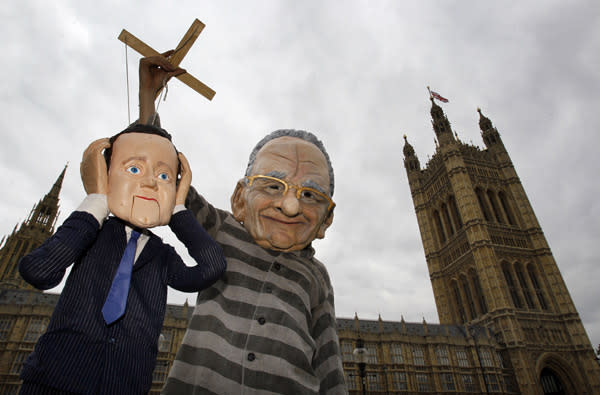 The Cutline
The CutlineHackgate update: Parliament declares ‘victory’ but News Corp. stock rebounds

Here's a quick, end-of-day update on the still-simmering phone hacking scandal that's engulfed Rupert Murdoch and his News Corp. media empire on both sides of the Atlantic.
• Parliament convenes, gloats: Shortly after News Corp. announced it would drop its $12 billion bid for BSkyB, members of the British Parliament--who had planned a vote to put pressure on the company to give up its pursuit of the satellite broadcaster--convened a meeting anyway, mainly to gloat about their "victory." And then they went ahead and voted, unanimously passing a motion opposing Murdoch's takeover of BSkyB.
"It was a pointless vote," the Guardian noted, "because Murdoch--in what I suppose you could interpret as a typical snub to parliament--upstaged them with his own announcement earlier today that the bid was off."
• 'Darkest hour': Nonetheless, there were plenty of impassioned speeches from lawmakers, like this one from Gordon Brown: "Many, many wholly innocent men, women and children who at their darkest hour, at the most vulnerable moment of their lives, with no one and nowhere to turn, found their properly private lives, their private losses, their private sorrows, treated as the public property of News International. Their private and innermost feelings and their private tears bought and sold by News International for commercial gain."
Chris Bryant, a member of the Labour party, argued that News Corp. should not be allowed to maintain its current stake--about 40 percent--in BSkyB.
• Seller's remorse: Members of the Bancroft family--which sold Dow Jones and the Wall Street Journal to Murdoch in 2007 for $5.6 billion--are speaking out against News Corp., behavior, saying they now regret the deal.
"If I had known what I know now," Christopher Bancroft said. "I would have pushed harder against [the sale] ... I probably would have held out."
But as Huffpo's Michael Calderone pointed out, there were plenty of Dow Jones staffers who warned the Bancroft family about Murdoch's excesses before the sale.
"The ethics are clear to me," Lisa Steele, a former Dow Jones board member, said Wednesday. "What's been revealed, from what I've read in the Journal, is terrible; it may even be criminal."
• 'A great bad man': In the Financial Times, Conrad Black, the disgraced former editor of the Telegraph newspapers, compared Murdoch to Napoleon, calling him a "great bad man."
• Can Murdoch survive the scandal? "In the midst of a media frenzy, it is always dangerous to make definitive judgments," John Cassidy wrote in the New Yorker. "But at the moment it is hard to see how Murdoch can ever fully recover from the blows he has suffered in the last few days."
• Stock rebounds: Today at least, investors sent a signal that they may disagree with Cassidy. News Corp. stock climbed 58 cents per share--or about 4 percent--on Wall Street on Wednesday, rebounding after four consecutive days of declines.
